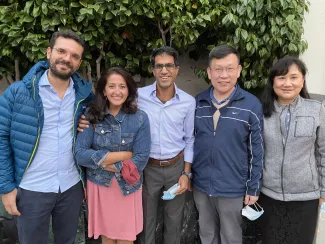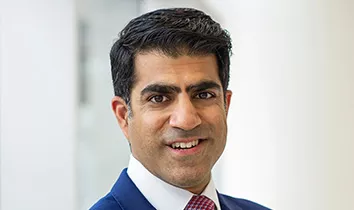Maker Lab


Ajay Maker, MD
The Maker laboratory focuses on studying tumor biology in order to better understand markers of malignant transformation and to create novel approaches to target cancer cell death. His team is researching the role of the immune system in cancer, specifically in gastrointestinal cancers that have metastasized and spread to the liver. Ajay Maker and his team are working towards identifying immunotherapeutic agents and novel combination therapies for these conditions and initiating clinical trials to investigate them. His research has been supported by foundations, pharmaceutical companies, the Department of Defense, and he was awarded the prestigious NIH MERIT award by the National Cancer Institute/National Institutes of Health to study the immunobiology of GI cancers. An additional focus of his research is in early detection of pancreatic cancer by identifying pancreatic cysts at risk for malignant transformation. As a leader in the research of novel biomarkers for this disease, he has identified predictive biosignatures of neoplasia from IPMN pancreatic cyst fluid.
Laboratory
Dr. Ajay Maker’s research focuses on cancers of the gastrointestinal tract and hepatopancreatobiliary system. During his post-doctoral training he performed translational immunotherapy research under Dr. Steven Rosenberg at the National Institutes of Health, where he and his colleagues were of the first to identify the utility of an anti-CTLA4 antibody as an anti-cancer treatment for patients with metastatic melanoma, and investigated its immunological mechanism of action in Phase I/II trials with Ipilimumab. Since that time, his lab has been interested in understanding the response of the immune system to primary gastrointestinal cancers and their metastases. They have determined that a tumor microenvironment reflective of T-cell proliferation and activation is associated with improved survival in patients with colorectal liver metastases. They have since identified candidate genes and cytokines that are potential therapeutic targets for enhancing the anti-tumor immune response in these patients and are currently developing techniques to stimulate this process.
In addition, Ajay Maker MD has an interest in using targeted therapy to incite cancer cell apoptosis. He and his colleagues have developed a technique to sensitize resistant gastrointestinal cancer cells to TRAIL induced apoptosis by manipulating tumor cell glucose metabolism. Investigation of the mechanisms responsible for this synergy have identified unique signaling pathways and miRNA targets that may provide tumor-specific targets for therapy.
Additionally, Dr. Maker’s laboratory is interested in identifying immunologic markers of cancer in pancreatic cystic tumors. A great challenge in the clinical management of mucinous tumors of the pancreas is determination of appropriate timing for pancreatic resection. He and his colleagues have previously determined the utility of EUS-FNA in evaluation of mucinous cysts, and have identified unique mucin and cytokine markers of pancreatic malignancy. Along with colleagues in the Branch-Duct IPMN International Expert Conference Biomarkers Working Group, they have reported upon current and future biomarkers for pancreatic cystic tumors.
Clinical
Dr. Ajay V. Maker MD is a surgical oncologist with board certification in general surgery. His expertise include treating benign and malignant diseases of the liver, bile ducts, gallbladder and pancreas, as well as colon, stomach, and other gastrointestinal cancers, melanoma, and sarcoma. He joined the Division of Surgical Oncology and the Department of Microbiology and Immunology at the University of Illinois at Chicago after completing a fellowship in surgical oncology with a focus upon hepatopancreatobiliary surgery at Memorial Sloan-Kettering Cancer Center, and a post-doctoral fellowship in Tumor Immunology and Surgical Oncology at the National Cancer Institute. Dr. Maker cares for patients as part of a multidisciplinary team of medical oncologists, radiation oncologists, gastroenterologists, and radiologists who specialize in treating patients with these specific cancers and he runs the multidisciplinary gastrointestinal cancer tumor board for the Creticos Cancer Center. His expertise helps the team diagnose cancer, determine its stage of development, and provide leading-edge technology, including minimally invasive (laparoscopic and robotic) surgery to remove tumors. He also performs isolated limb infusion for advanced melanoma and sarcoma, and his team performed the first procedure of its kind in Chicago in 2011. His team’s clinical research is focused on technical advancements in surgical oncology and evaluation of outcomes data in large cancer patient datasets.
